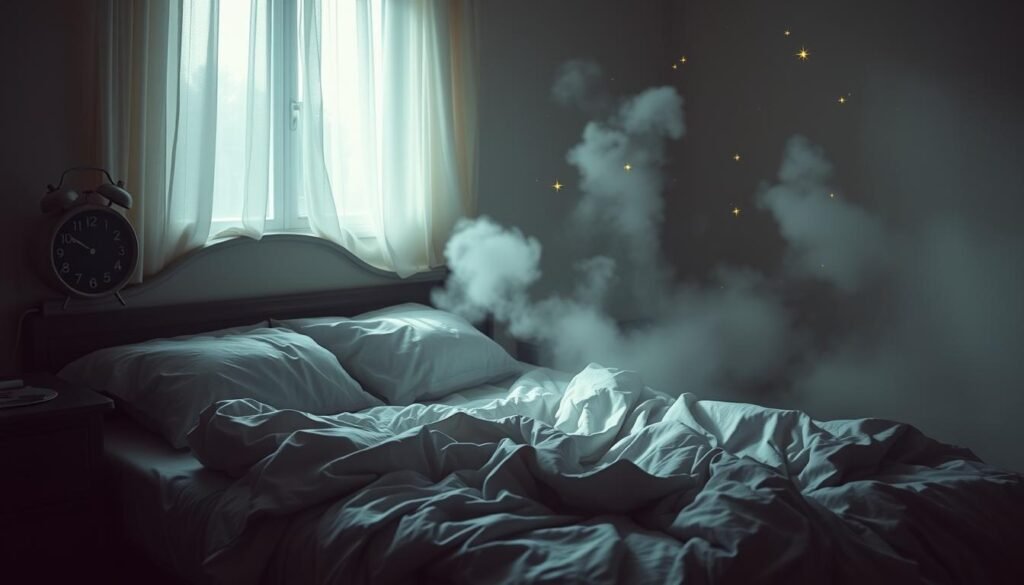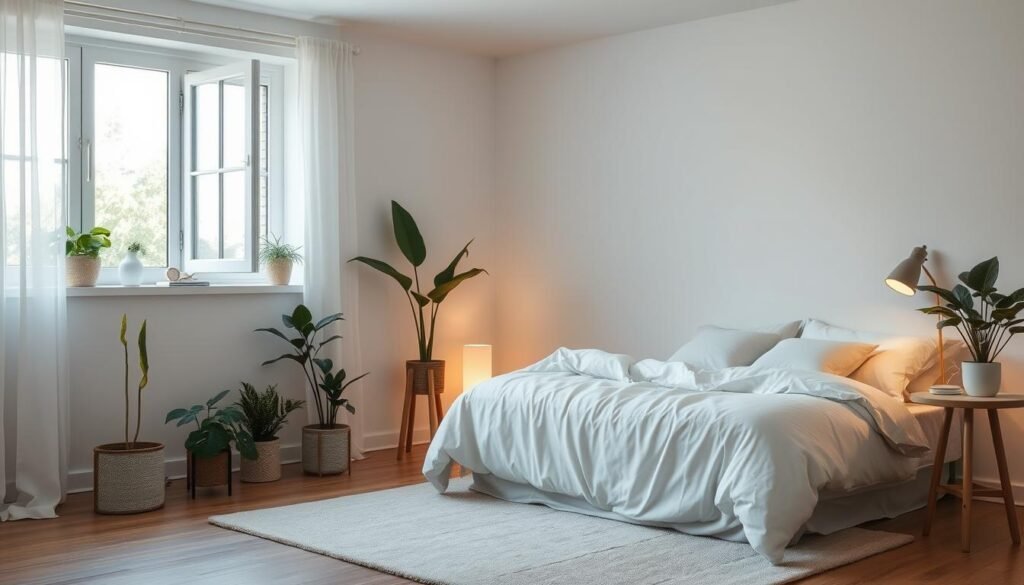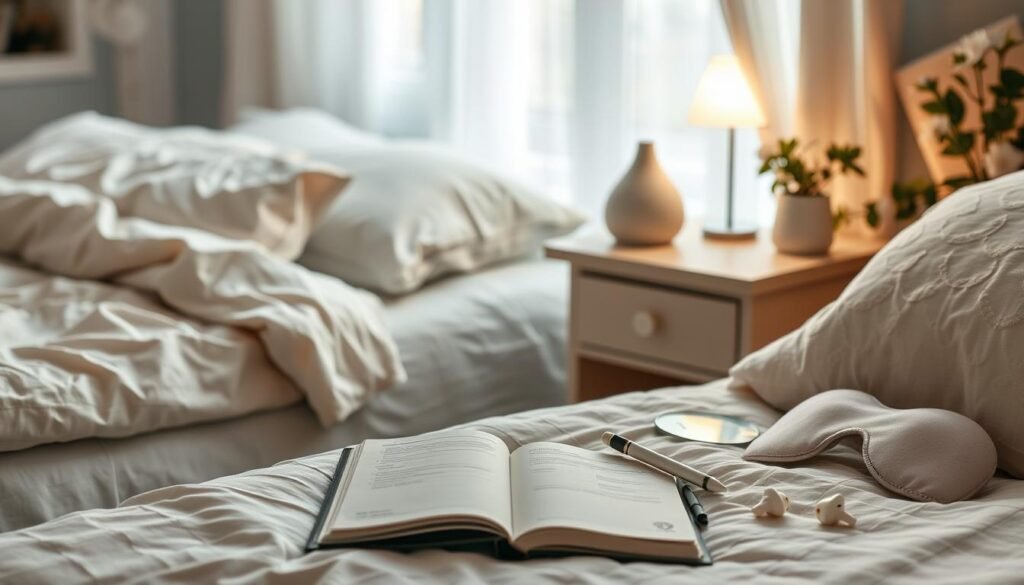Did you know that insomnia affects as many as 35% of adults in the United States? This common sleep disorder can significantly impact one’s well-being and daily life. Middle insomnia, waking up in the night and having trouble going back to sleep, breaks up your sleep cycle. This can lead to many health problems. Understanding what leads to middle insomnia is key to better sleep and solving sleep disorder issues.
Every day stresses can make sleep maintenance insomnia worse, especially for those with mental health issues. This guide explores why middle insomnia happens and how to manage it effectively.
Key Takeaways
- Insomnia impacts 35% of adults, highlighting a widespread issue.
- Middle insomnia leads to fragmented sleep and daytime fatigue.
- Stress and anxiety significantly contribute to middle-of-the-night awakenings.
- Certain medical conditions and sleep disorders can impair sleep quality.
- Establishing good sleep hygiene practices is crucial for managing insomnia.
- A healthy routine and lifestyle changes can improve overall sleep quality.
Understanding Middle Insomnia
Middle insomnia means you wake up often during the night. It leads to a broken sleep pattern. In the U.S., about 10% to 30% of people have this issue, says the National Sleep Foundation.
Studies show that older adults and women might have a higher chance of this problem. A study found that 77.5% of those with middle insomnia struggled during the day. This condition makes it hard to do well at work, school, or home.
Not dealing with insomnia can cause serious health issues, like diabetes or depression. It’s important to treat it right. Cognitive Behavioral Therapy for Insomnia (CBT-I) is a good way to address these sleeping issues.
Knowing more about middle insomnia helps spot triggers. It also tells when to seek help. This knowledge helps improve sleep and overall health.
| Type of Insomnia | Characteristics |
|---|---|
| Middle Insomnia | Difficulty staying asleep, frequent awakenings |
| Initial Insomnia | Difficulty falling asleep at the beginning of the night |
| Terminal Insomnia | Waking up too early and not being able to return to sleep |
What Causes Middle Insomnia
Understanding insomnia’s details helps people tackle their sleep issues. Middle insomnia, or sleep maintenance insomnia, means waking up often at night. This interrupts good rest. It’s caused by various reasons and is one type among others.
Definition of Middle Insomnia
Middle insomnia is waking up in the night and finding it hard to fall back asleep. It differs from sleep onset insomnia and terminal insomnia. Recognizing middle insomnia helps in understanding insomnia causes and addressing specific sleep problems.
Distinguishing Between Types of Insomnia
Different insomnia types need specific solutions. The main differences are:
- Sleep onset insomnia: Hard to fall asleep at bedtime.
- Sleep maintenance insomnia: Waking up often, difficult to sleep again.
- Terminal insomnia: Waking up too early, can’t fall back asleep.
Reasons for these vary, with middle insomnia often linked to stress, anxiety, hormones, and lifestyle. Knowing what causes middle insomnia aids in finding right fixes. Identifying your insomnia type helps focus on better sleep strategies.
Common Symptoms of Middle Insomnia
People with middle insomnia face big sleep troubles. They find it hard to stay asleep. Because of this, they often feel tired and struggle during the day.
Difficulty Staying Asleep
Waking up in the middle of the night is a common problem. Difficulty staying asleep makes the next day hard. Adults need about 7 to 9 hours of sleep, but many can’t get this. Stress, drinking alcohol, and smoking can make it worse.
Daytime Fatigue and Mood Changes
Sleep problems lead to daytime fatigue. This makes people sleepy at work, lowering productivity. Mood swings, like being irritable or anxious, often happen. These issues can affect how well someone functions daily. For more info on sleep issues, visit this link.
Health Conditions and Middle Insomnia
Many health issues can negatively impact sleep, causing middle insomnia. It’s important to understand how they’re connected. This knowledge helps in finding effective treatment ways.
Sleep Disorders Linked to Sleep Maintenance Issues
Sleep apnea and restless legs syndrome are key factors in sleep issues. They break up the sleep cycle, making people wake up often. Sleep apnea, for instance, changes breathing and causes most of the awakenings. Treating these sleep problems can make sleep much better.
Impact of Chronic Conditions on Sleep Quality
Chronic conditions are a big reason for poor sleep. They can lead to middle insomnia. Diseases like diabetes, heart diseases, and joint problems often disturb sleep. Here’s how:
| Chronic Condition | Effect on Sleep Quality |
|---|---|
| Heart Failure | Breathlessness can cause frequent night awakenings. |
| Overactive Thyroid | Can lead to nervous system overactivity, causing difficulties in falling asleep. |
| Anxiety and Depression | Commonly result in difficulties both falling asleep and staying asleep. |
| Fibromyalgia | Abnormal deep sleep patterns lead to poor sleep quality. |
| Nocturia | Frequent urination disrupts sleep, especially in older adults. |
Knowing about these conditions and their effects on sleep is key. With the right care, we can improve sleep despite chronic conditions.

Role of Stress and Anxiety in Sleep Disruption
Stress and anxiety can really mess with how well you sleep, especially with waking up during the night. Studies show that a lot of adults, between one-third and two-thirds, have sleep problems. And about 10% to 15% say it makes their days harder because their sleep isn’t solid. This situation can make anyone’s stress go up, making relaxing at night quite hard.
Being stressed all the time harms how deeply you sleep, and may even mess with your REM sleep. If someone has insomnia for at least three months, showing up at least three times a week, it’s considered chronic. This creates a tough cycle that seems to keep going. The body’s hypothalamic-pituitary-adrenal (HPA) axis, which helps control stress hormones like cortisol and adrenaline, can mess up sleep cycles. This action can make sleep problems even worse.
We deal with three types of stress: acute, episodic acute, and chronic, each affecting health differently. Chronic stress can lead to serious issues like high blood pressure and swelling, and hits mental health hard. Studies have found that 24% to 36% of people with sleeping problems also have anxiety disorders. This shows how closely linked anxiety and sleep problems are, underlining the need to tackle these mental health concerns for better sleep.
Handling stress and anxiety better can lead to improved sleep. Relaxation techniques, behavioral methods, and being mindful can lessen stress. These steps can make it easier to enjoy a good night’s rest.
Effects of Hormonal Imbalances on Sleep Cycles
Hormonal imbalances can drastically upset sleep patterns. This is especially true for women going through changes like the menstrual cycle and menopause. These stages often lead to sleep issues, including insomnia.
When hormones fluctuate, keeping a regular sleep schedule becomes hard. This can make symptoms of insomnia worse at night.
Impact of Menstrual Cycle and Menopause
The balance of hormones, like estrogen and progesterone, is key to sleep regulation. Hormone changes during the menstrual cycle can disturb sleep. This is more so just before menstruation begins.
Menopause brings its own sleep challenges, like night sweats and waking up often. Studies show that insomnia is a widespread issue during menopause.
Pregnancy and the period after giving birth can also see sleep quality dip due to hormonal changes. Thyroid problems, both hyperthyroidism or hypothyroidism, further affect sleep. Similarly, high cortisol levels in the morning can make sleeping tough.
There are ways to manage these sleep disruptions. Lifestyle adjustments, natural remedies like melatonin, and cognitive behavioral therapy can offer relief. Knowing how these factors are linked helps in finding effective sleep solutions.
Habits That Contribute to Middle Insomnia
Middle insomnia is often linked to our daily habits. Many don’t see how these habits affect their sleep. Poor sleep hygiene and too much technology use before bed are key issues. By tackling these, you can sleep better and boost your overall health.
Poor Sleep Hygiene Practices
Poor sleep hygiene can harm your sleep. For example, not sleeping at the same time every night can throw off your body’s clock. Drinking caffeine too late or eating right before bed can also make sleeping hard. Getting into a good bedtime routine helps fight middle insomnia.
Overuse of Technology Before Bedtime
Using technology is a big part of life today. Using your phone or watching TV before bed can keep your brain buzzing. The blue light from screens can mess with sleep hormones. To sleep better, try calming activities like reading instead of screen time at night. You can find more about how behavior affects sleep here.
Environmental Factors Affecting Sleep Quality
The sleep environment greatly affects our ability to get restful sleep, especially if you have insomnia. Things like room temperature and how much light you’re exposed to while trying to sleep can mess up sleep patterns. They can also cause sleep issues over time.
Temperature and Light Exposure in the Bedroom
Having the right temperature is key for good sleep. If it’s too hot, it’s tough to start and keep sleeping. A cooler room, around 60-67°F, is best for sleeping well. Also, light exposure is important for regulating sleep. Blue light from screens can mess with your melatonin levels, which makes it hard to sleep without waking up. Cutting down screen time before bed and using blackout curtains can lessen these problems.
The Importance of a Comfortable Sleep Environment
A comfy sleep environment includes a good mattress, managing background noise, and no distractions. Research shows that people near green spaces sleep better. Making your room clean, quiet, and dark helps you sleep better. A good sleep environment improves your sleep quality and reduces sleep problems.

Medications and Their Impact on Sleep Maintenance
Many things can mess up your sleep. This includes different medicines. Both meds your doctor prescribes and ones you can buy yourself can change how well you sleep. Knowing how these meds can affect you is key, especially if you have trouble staying asleep.
Prescription Drugs and Their Side Effects
Prescription meds often have many side effects. Some can make it hard to sleep. Drugs for issues like depression, asthma, and high blood pressure might mess with your rest. Here are some meds to watch out for:
| Medication Type | Example | Effects on Sleep | Notable Side Effects |
|---|---|---|---|
| Benzodiazepines | Zolpidem, Eszopiclone | Improve short-term sleep but can lead to tolerance | Memory loss, dizziness, potential for addiction |
| Orexin Receptor Antagonists | Suvorexant | Assist with sleep-onset and maintenance | Next-day performance impairment |
| Melatonin Receptor Agonists | Ramelteon | Modestly effective for sleep-onset | Minimal adverse effects |
| Tricyclic Antidepressants | Doxepin (Low Dose) | FDA-approved for sleep-maintenance | Few significant adverse effects |
Using some meds for a long time, like benzodiazepines, can cause big problems. These include side effects and addiction. Experts say we shouldn’t use them all the time for sleep issues.
Over-the-Counter Sleep Aids
Many people use over-the-counter sleep aids, like first-generation antihistamines. These can help you sleep for a bit. But using them a lot can cause problems like:
- Next-day drowsiness and performance impairment
- Potential for dependency on sedative effects
- Limited effectiveness over time
If you’re using any sleep meds, it’s crucial to see how they affect you. Talk to a doctor if you have concerns.
Treatment Options for Middle Insomnia
There are many ways to help with middle insomnia. They focus on different parts of keeping sleep steady. Useful methods include therapy, medication, and changes in daily habits. A key option is cognitive behavioral therapy for insomnia (CBT-I). It’s a plan that changes bad sleep patterns and thoughts.
Cognitive Behavioral Therapy for Insomnia (CBT-I)
CBT-I stands at the forefront for treating insomnia. It works as well as, if not better than, sleep meds. The therapy changes bad thoughts and actions related to sleep. Techniques like sleep restriction and stimulus control are used. CBT-I gives people tools for better sleep habits.
Lifestyle Changes to Improve Sleep Quality
Making changes in your lifestyle can boost your sleep quality. Here are some tips:
- Keep a steady sleep schedule
- Exercise regularly
- Avoid daytime naps
- Cut down on caffeine, alcohol, and nicotine before bed
These changes are simple but can make a big difference in sleep. Also, trying melatonin, acupuncture, yoga, or tai chi can help. They work well with other treatments.

| Treatment Option | Description | Effectiveness |
|---|---|---|
| Cognitive Behavioral Therapy (CBT-I) | A structured approach targeting sleep-related thoughts and behaviors | Highly effective, often as effective as medications |
| Prescription Medications | Includes drugs like Eszopiclone, Ramelteon, and Zolpidem | Useful but should not be the sole treatment |
| Lifestyle Changes | Adjustments to sleep schedule, exercise, and substance intake | Significantly improves sleep quality |
| Alternative Therapies | Includes melatonin, acupuncture, and yoga | May offer benefits, particularly in conjunction with other treatments |
By using cognitive behavioral therapy and changing your lifestyle, you can fight middle insomnia. This way, you can enjoy better sleep every night.
Preventing Middle Insomnia
Improving sleep quality boosts overall well-being. Setting a regular sleep schedule and steering clear of stimulants cuts down night disturbances.
Establishing a Regular Sleep Schedule
A stable sleep routine is key for the body’s clock. Sleeping and waking at the same time daily fosters healthy sleep habits. Luis F. Buenaver, Ph.D., C.B.S.M., highlights its significance for better sleep.
Sticking to a fixed sleep timetable reduces waking up at night.
Avoiding Stimulants Before Bedtime
Avoiding caffeine, nicotine, and big meals before bed helps sleep. These can keep you from falling back asleep easily. Those who skip stimulants enjoy more peaceful nights without disruptions.
Conclusion
Middle insomnia hits many, hurting not just sleep but also health and happiness. Around 25% to 33% of people face sleep troubles. Over 10% have chronic insomnia that needs a doctor’s care. This matters because such insomnia can wreck job performance and life quality.
It’s key to know what causes insomnia, like health issues, stress, and daily habits. Studies tell us more women and seniors, especially over 65, struggle with it. To beat it, try better sleep routines. This means looking into therapies for behavior and keeping a regular bedtime. Also, getting treatment for any health or mind issues helps sleep a lot.
Changing how you live and checking out treatment choices can help you tackle middle insomnia. You can get back good sleep. For extra help, look at insomnia advice and gain insights on sleep and moods at this link. Taking steps to handle insomnia improves sleep, health, and emotional well-being.